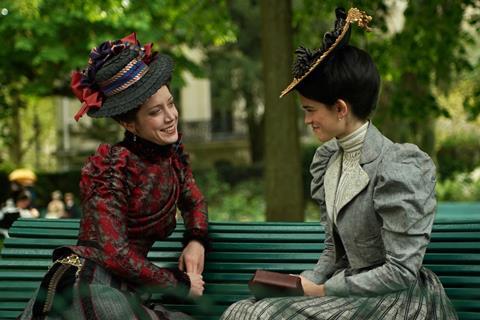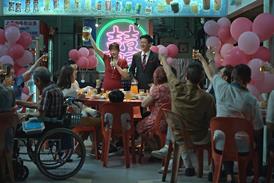Suzanne Lindon headlines a film which is ‘entertaining and classy, if shamelessly contrived’

Dir. Cédric Klapisch. France 2025. 124 mins
Past, present and a generous helping of poetic license all merge entertainingly in Cédric Klapisch’s classy, if shamelessly contrived Colours of Time. A thoughtful comic meditation on changing social mores over approximately 125 years, Klapisch’s film re-examines some much-loved myths and images of French history – particularly from the heyday of Impressionism – looking back at the origins of modernity from the vantage point of an anxious present which, the film contends, has forgotten how to live.
Suzanne Lindon is characterfully persuasive in a juicy lead role
Following her striking debut in 2020’s self-directed Spring Blossom, Suzanne Lindon is characterfully persuasive in a juicy lead role, and buoyant support from the familiar likes of Vincent Macaigne, Cécile de France and up-and-comer Paul Kircher – plus Klapisch’s considerable mainstream prestige - should bode well for the film’s French release immediately following its Cannes Out Of Competition premiere. Irresistible appeal to old-school Francophiles should also make this the director’s most exportable film for some time.
In the present day, a diverse group of individuals discover that they are all descended from the same woman: Adèle Meunier (Lindon), who hails from the Normandy countryside. With Adèle’s abandoned house due for demolition, four descendants undertake to enter the premises and inspect its contents. They are anxious exec Céline (Julia Piaton), affable neo-hippie beekeeper Guy (Macaigne), French teacher Abdel (Zinedine Soualem, a long-time Klapisch player) and Seb (Abraham Wapler), a young online content creator who’s just about ready to start looking at the world around him in a less ephemeral light.
Klapisch cuts between this quartet – plus their investigative ally, art historian Calixte (De France) – and the adventures of Adèle who, in the last years of the 19th century, leaves Normandy and heads for Paris, in search of her lost mother. She arrives by riverboat, making the acquaintance of two young hopefuls – painter Anatole (Kircher) and photographer Lucien (Vassili Schneider). Adèle tracks down Maman (a very affecting Sara Giraudeau) and learns her story, while moving in with her two new friends in then-very-rural Montmartre. Meanwhile, assorted eminences of the period flit in and out of the action to crisply droll effect, including Sarah Bernhardt, photography pioneer Nadar and one particular artist whose creations provide a key thread throughout.
The contrivance can be wilfully goofy, as in a sequence that sees the sleuths visiting the past on a collective ayahuasca trip. But Klapisch and co-writer Santiago Amigorena play the temporal zig-zagging astutely, showing each period reflected in the other. Notably, they demonstrate how the Belle Epoque, an age we may be inclined to regard as quaintly romantic, was perceived by those who lived through it as a flurry of radical change, both heady and disturbing.
To us, the streets of fin de siècle Paris may look reassuringly calm, but the film also lets us see them through Adèle’s eyes as a frenetic bustle, the newly erected Eiffel Tower looming as a precursor of a barely imaginable era to come. The film’s French title La Venue de l’Avenir means ‘The Coming of the Future’, but is also a smart bit of wordplay in a scene involving the electrification of a key thoroughfare, marking the city’s irrevocable transformation.
Marie Cheminal’s production design and the meticulous re-creation of period objects, painting and documents – like the treasure trove of weathered memorabilia in Adèle’s house – provide a real sense of tangible substance. Nineteenth-century Paris comes alive thanks to a mixture of studio shooting, CGI and what looks very much like traditional matte painting, alluding to a tradition (both artistic and touristic) of representing the city in paintings, sepia photographs and picture postcards.
It’s all part of the pleasure of a film that is unashamedly crowd-pleasing, sometimes self-mocking in its occasional touches of theme-park kitsch. Colours of Time nudges its audience a little heavily, if cheerfully so, with its historical references, and self-confessedly (as per an end title) plays fast and loose in its accuracy, but is genially inventive in messing with the codes of period cinema.
Production companies: Ce Qui Me Meut, Studio Canal
International sales: Studio Canal, margaux.audoin@canal-plus.com
Producers: Cédric Klapisch, Bruno Lévy
Screenplay: Cédric Klapisch, Santiago Amigorena
Cinematography: Alexis Kavyrchine
Editor: Anne-Sophie Bion
Production design: Marie Cheminal
Music: Robin Coudert
Main cast: Suzanne Lindon, Abraham Wapler, Vincent Macaigne, Julia Piaton

























No comments yet